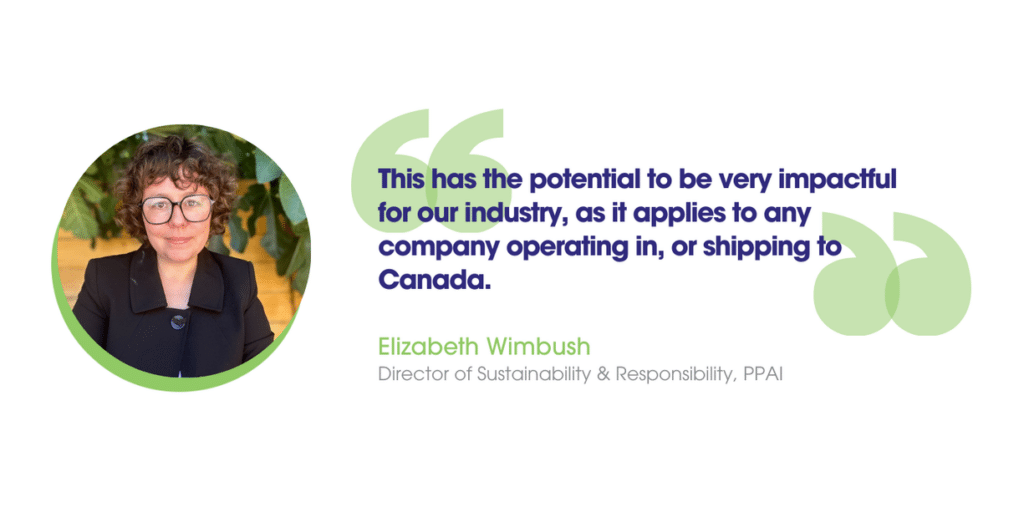The Canadian government recently enacted amendments to Canada’s Competition Act aimed at tackling greenwashing claims in business. Greenwashing is a blanket term for unsupported claims about the environmental benefits of a company’s products or services.
The amendments require businesses to substantiate assertions of their products or services’ environmental friendliness with test data or internationally recognized methodologies.
- The relevant revisions to the Competition Act fall under its Deceptive Marketing Practices section.
The act now specifically outlaws public claims about “a product’s benefits for protecting or restoring the environment or mitigating the environmental, social and ecological causes or effects of climate change that is not based on an adequate and proper test.”
“This has the potential to be very impactful for our industry, as it applies to any company operating in or shipping to Canada,” says Elizabeth Wimbush, PPAI’s director of sustainability and responsibility.
Significant penalties are included in this amendment to enforce the ban of greenwashing.
- Breaching the “deceptive marketing” provision could result in a fine up to the greater of $10 million ($15 million for subsequent orders) or three times the value of the benefit derived from the deceptive conduct, or 3% of the company’s annual revenues.

Governments around the world are beginning to more closely monitor the ways in which businesses claim to be helping the environment with their sustainability practices.
- The EU recently deemed that carbon offsetting cannot be labeled as “carbon neutral.”
- PPAI’s Product Responsibility Summit is September 22-24 in Alexandria, Virginia and is designed to help promo companies maintain compliance with sustainability and safety standards.
A Shift In The Burden Of Proof
Notably, the burden of proof does not lie with the Competition Bureau to make its case that the company is acting dishonestly.
- Instead, the burden “lies on the person making the representation” to prove the act is not being violated. In other words, as soon as a company makes a public claim about the way its practices are environmentally responsible, that company must be able to prove such claims with evidence to avoid facing penalty of the law.
This shift means promo companies doing business in Canada need to be absolutely certain their claims can be backed up by more than just good intentions.
“When in doubt, measure it out,” advises Wimbush. “Any impact claims you make should be backed by verified data. Rely on your supply chain partners to validate claims like recycled content, reduced carbon footprints or social impact metrics.”
Such policing of environmental claims is becoming a trend, and it could be a matter of “if” not “when” the U.S. moves toward adopting similar policies for businesses to adhere to.
“We’ll likely see similar guidelines when the FTC Green Guides are updated here in the U.S., but in the meantime, this is a great general standard to use as a baseline when it comes to any sustainability claims.”
The amendments were part of bill C-59, the Act to implement the Fall Economic Statement, which passed on June 19 and received Royal Assent – becomes a law in Canada – on June 20. Other aspects of the bill include:
- Additional tools for Canada’s Competition Tribunal to scrutinize mergers for anti-competitive impacts on the market.
- Enhances the bureau’s ability to address agreements between competitors that reduce competition in the marketplace and extends those powers retroactively.


